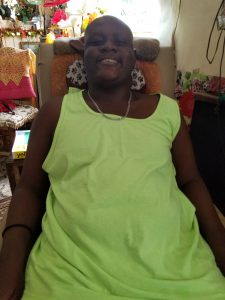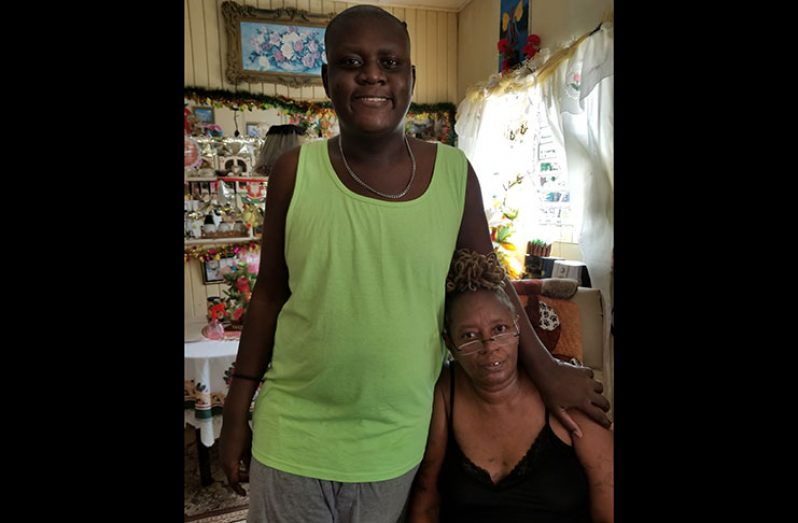By Naomi Marshall
WHILE other mothers got to see their children meet developmental milestone after milestone such as smiling, talking, developing greater independence, self-control, and creativity, Michelle Bastiany was left waiting on her son to meet at least one of those milestones.
On December 8, 1996, Bastiany, who was an alcoholic and drug addict at the time, gave birth to a beautiful baby boy, Nkossi Johnson, who became the light of her world.
As months passed, things seemed to be fine with Johnson until it came to the stage where he should have been talking, but he didn’t utter much.
“At age three he started getting the mama and papa and then his words would not come out clearly, we wouldn’t understand. People were saying that some children do take long to talk so I had hopes in that,” Bastiany told the Pepperpot.
Things never changed with Johnson, instead, he began holding his ears and screaming very loudly on a regular basis. Nevertheless, Bastiany was in denial of her son being anything other than normal, so she would ignore comments such as, “something is wrong with your son,” and “your son is not normal.”
“I didn’t think that God would give me a child and something wrong with it so I was in total denial,” said the 53-year-old.
At age five, Johnson was visited and observed by a family friend who lived overseas and had a granddaughter with autism. The family friend observed that Johnson displayed signs like her granddaughter and suggested he was autistic.
After numerous visits to the hospital, Johnson was diagnosed with autism by doctors from the United States of America who were carrying out a drive at the Georgetown Public Hospital.
Not knowing what autism was, Bastiany began researching the condition and how to deal with children on the spectrum.

According to the Autism Society, “Autism is a complex, lifelong developmental disability that typically appears during early childhood and can impact a person’s social skills, communication, relationships, and self-regulation.”
“Autism is defined by a certain set of behaviours and is a spectrum condition that affects people differently and to varying degrees. There is no known single cause of autism,” the society added.
Refusing to let her son be left behind and not have an enjoyable life, the woman, who lives in Diamond began to give her son extra attention. Through videos and other media, the social worker and counsellor examiner for HIV began to teach her son how to read, write,and to be independent and creative.
According to the Autism Spectrum Disorder Foundation, early diagnosis is significant in helping a child with autism live a normal life in society.
Today 24-year-old Nkossi Johnson is a living testimony that early detection and intervention can lead to a person having an improved quality of life, once the support and services that they need are provided.
Bastiany describes her son as sweet, brilliant, honest, kind, understanding and a lover of National Geographic and Dinosaurs.
She expressed, “He taught his stepfather and I how to apologise, to be nice to others and a whole lot of other things. He is the light of our lives and I am proud of my son, because he really came a far way.”
Presently, Bastiany is focused on making all her son’s dreams come through, including gifting him the opportunity to see snow.
Meanwhile, Bastiany thinks that society should be more educated about persons with disability to decrease the ignorance it posseses with regard to persons living with disabilities.
“When we are going down the streets people would trouble him about how he moves or behaves and I think that society at large has to be more receptive to children living with disabilities, because people on the outside are ignorant and they lash out. I am asking the public to be nice to persons living with disabilities,” she pleaded.
Additionally, the mother stated that parents of children with disabilities must make a special effort to bond and teach their children independence.
“You are not going to live forever, so you need to make your child equipped so if anything happens to you, your child won’t be mistreated. Parents need to make their special-needs children more independent and teach them ownership,” she added.
According to the Autism Society, early signs of autism in children include speaking later than usual or not at all; repetition in language or movement; uncommon nonverbal communication, including avoiding eye contact, giving few facial expressions, or having a monotone, and being extremely distressed by changes, including new foods or changes in schedule, amongst others.



.jpg)








